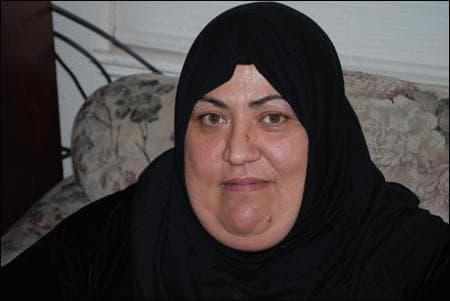Advertisement
Mass. Refugees Lose Lifeline In Rescue Agency Closing
Resume
After more than 30 years resettling refugees in Massachusetts, the International Rescue Committee is closing its offices in Boston on Monday. Newly arrived refugees — many of them Iraqis — worry about navigating this expensive state without a lifeline.
Awatif Al Badri lives in a cramped apartment in Chelsea with three of her children. She came to Boston in September, after losing her house in Baghdad to sectarian violence. She is Sunni, and Shia took over the neighborhood. Then something far worse happened.
She says her son went south to Basra to look for work. That's where he was killed by Shia militia.
Now she's far away from that violence, but struggling with new problems. She can't speak English and arrived here without knowing a soul. But she did get help from the International Rescue Committee.
Sean Morgan is Al Badri's case worker. He listens and translates as she recalls, in Arabic, the help she received from the IRC from the moment she and her family arrived. Morgan says he went to the airport at 1 a.m. and brought them to the apartment they live in today.
"The apartment was ready. The furniture was ready," he says. "The next day we took them to the public offices, we applied for social security, we applied for food stamps and cash assistance. She is saying that we did everything in our power to help them."
Morgan came here from Baghdad. He was worried about his family's safety back in Iraq, so he quickly changed his name when he resettled in Boston.
At the IRC, he helps dozens of Iraqi families. And while Al Badri is on the phone, Morgan admits he has a soft spot for her. "She's one of my favorite clients," he says. "She's so strong and she's kept her family together. That's impressive. That's not easy."
It's easy to see why Morgan likes Al Badri. She gesticulates wildly when she speaks and smiles a lot. She's very overweight and has a lot of medical problems because of it. That's why she and many other gravely ill and wounded Iraqis have come to Boston, and part of what made it difficult for the IRC to make ends meet.
Until last month, Rita Kantarowski was the IRC's executive director in Boston. Now she is dismantling its office near the Statehouse. They officially close the doors on Monday, after 30 years and having resettled approximately 25,000 refugees.
"The Boston office was opened to help resettle a number of mostly Vietnamese single men," Kantarowski says. "Because the other agencies that may have used a local church congregation or other kind of group, the singles didn't quite fit their format for resettlement."
This office later started specializing in helping refugees with serious medical problems, since Boston is renowned for its hospitals. But the problem was that those clients require a lot more assistance and, like Al Badri, they often can't work.
And although the cost of living has increased since the IRC started this office, the federal government's subsidy for assisting refugees hasn't kept pace with inflation. In 1979, the government paid agencies $565 a month per refugee. Now its $900. And there was no adjustment for the high cost of living in Massachusetts.
Kantarowski says they've always struggled with the budget. "In the last year, with the fall of the stock market and everything that happened in the recession and the economy made it the perfect storm." She hopes her clients will get help from the handful of other agencies around the state.
Among them is Catholic Charities, which resettles about 100 refugees a year. Marjean Perhot runs its office for refugee and immigrant services.
"We're losing a lot of really good capacity to help refugees in the area, and I'm really concerned about the refugees who are feeling really lost," Perhot says. She's already taken on more than a dozen of the IRC's cases and says she's willing to absorb more.
Another agency, the International Institute, is lobbying Congress to increase the federal subsidy for agencies that help refugees. Otherwise, they say, this work is untenable.
But none of that will help Awatif Al Badri. Her case was officially closed after eight months, the limit for a refugee case. The IRC would have continued to help her. For better or worse, they had a policy of never closing cases. But now that they're closing, Al Badri and her three kids will have to find their own way.
Her 18-year-old son just got laid off, so now her family's only income is $575 in welfare. But that's far from enough to cover her rent of more than a thousand dollars a month. Her best immediate hope is an application for rental assistance filed by the IRC.
Al Badri says she thought she would get a break after the hardship that she saw in Iraq. She didn't imagine this kind of hardship here.
This program aired on May 29, 2009.